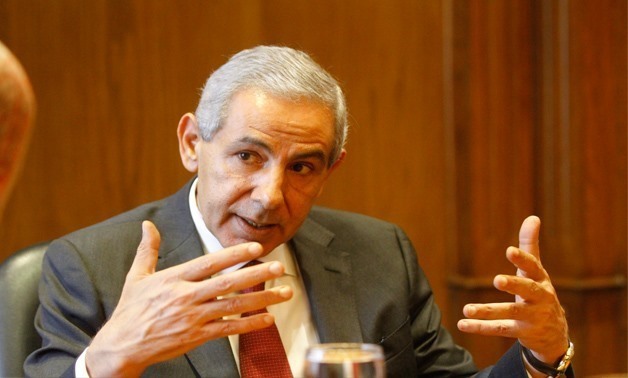
FILE- Trade Minister Tarek Kabil
CAIRO - 14 February 2018: Trade and Industry Minister Tarek Kabil said on Wednesday Egyptian-British economic cooperation is deeply-rooted and based on common interests.
There is a full coordination between Egypt and Britain to maintain strategic relations whether within bilateral or multilateral frameworks, Kabil said during an expanded meeting with a delegation grouping 15 major British companies.
The delegation is accompanying British Trade Envoy to Egypt Jeffrey Donaldson during his current visit to Egypt.
He said Britain is the biggest foreign investor in the Egyptian market, stressing that the Egyptian government is keen to iron out any hurdles facing British investors to help them either expand their current investments or set up new ones.
Kabil referred to the reform program adopted by the Egyptian government to rectify the country's economic track, saying it included a historic program to boost infrastructure based on twining the Suez Canal waterway, developing the Suez Canal corridor, setting up a 5,000-kilometer road network, building three new ports and developing three other ones, setting up 12 new cities and 500,000 social housing units and building many drainage plants and new industrial zones.
The government also made a legislative revolution to boost investments and increase production, Qabil said citing the issuance of the new investment law and amending the law regulating the issuance of industrial licenses.
The government also adopted an important financial program based on liberalizing the Egyptian pound, obtaining a loan from the International Monetary Fund, gradually cutting subsidy and implementing 85-billion-pound social solidarity programs, he added.
Kabil referred to efforts by the government to put the national economy back on the right track, saying these efforts succeeded in cutting down deficit to 9.5 percent, increasing Gross Domestic Product to 4.9 percent, doubling foreign cash reserves, increasing local and foreign investments, upping exports and downing imports by 20 billion dollars and achieving an unprecedented growth in industrial production.
The minister further said adopted a strategy to enhance industrial development and foreign trade that runs in line with the ambitious economic reform programs applied by the government.
The strategy, he said, aims at increasing industrial growth rates to 8 percent, setting up more small and medium-sized enterprises, providing three million jobs, increasing exports to cut down the trade balance deficit by 50 percent and developing technical education.
The ministry boosted the Egyptian market by clinching a number of Free Trade Area agreements with many countries and economic blocs that helped increase the number of Egypt's target consumers to 1.8 billion in the Arab world, the EU, COMESA, Mercosur, the US and Turkey.
Egypt's target consumers will rise to 2.2 billion after concluding a Free Trade Area agreement with the Eurasian Economic Union and to 2.6 billion after finalizing the African Tripartite Free Trade Area (TFTA) agreement involving the Common Market for Eastern and Southern Africa (COMESA), the Southern African Development Community (SADC) and the East African Community (EAC).
As for exports, the ministry set up the Export Development Authority to be in charge of facilitating Egyptian products' access to foreign markets to increase exports.
A logistics center was set up in Kenya to allow Egyptian products into East Africa market, he said, adding that another one will be set up for West Africa markets.

Comments
Leave a Comment